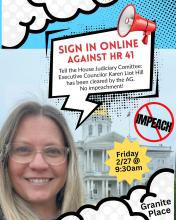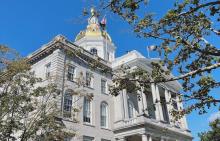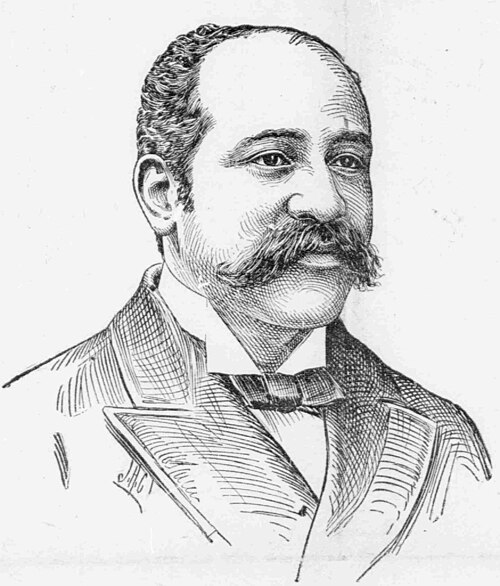In the New Hampshire State Constitution Article 37 states:
[Separation of Powers.] In the government of this state, the three essential powers thereof, to wit, the legislative, executive, and judicial, ought to be kept as separate from, and independent of, each other, as the nature of a free government will admit, or as is consistent with that chain of connection that binds the whole fabric of the constitution in one indissoluble bond of union and amity. June 2, 1784
And lest we become confused by the word “ought”, according to the Merriam-Webster Dictionary: “Ought is an auxiliary verb that indicates obligation, duty, advisability, desirability, or probability.” (emphasis added)
Which brings me to a few Constitutional Amendments being proposed by the Free Stater/Liberty Alliance members in the Legislature, now looking to control the courts. And that’s UNconstitutional, by the way . . .but first . . .
[Art.] 4. [Power of General Court to Establish Courts.] The general court (except as otherwise provided by Article 72-a of Part 2) shall forever have full power and authority to erect and constitute judicatories and courts of record, or other courts, to beholden, in the name of the state, for the hearing, trying, and determining, all manner of crimes, offenses, pleas, processes, plaints, action, causes, matters and things whatsoever arising or happening within this state, or between or concerning persons inhabiting or residing, or brought, within the same, whether the same be criminal or civil, or whether the crimes be capital, or not capital, and whether the said pleas be real, personal or mixed, and for the awarding and issuing execution thereon. To which courts and judicatories, are hereby given and granted, full power and authority, from time to time, to administer oaths or affirmations, for the better discovery of truth in any matter in controversy, or depending before them. June 2, 1784 Amended 1966 to add exception relating to Art. 72-a, Part 2.
CACR 27 is an attempt at a power grab proposed by Rep. Bob Wherry, who scored an “A” on last years Liberty Alliance scorecard) the only sponsor. He wants to see Article 4 amended so that the “sole” authority to establish courts lies within the general court. They want the words “except as otherwise provided by Article 72-a of Part 2” to be removed. It would then read like it did back in 1784: “The general court shall forever have full power and authority to erect and constitute judicatories and courts of record, etc., etc.”
CACR 23 isbrought to us by Rep. Susan DeRoy (who scored an “A-”) and seeks to give “the general court the power to oversee and recommend discipline for members of the judicial branch”. What this means is that the legislature (general court) is seeking to form a commission to be mostly made up of members of the general court. This commission would have the power to investigate complaints against members of the judicial branch, conduct hearings, gather evidence, recommend disciplinary actions including censure, suspension, or removal of judges and to publish annual reports on the conduct and performance of judges. The general court would also have the power to establish the membership of the commission and establish the procedures for the filing and investigation of complaints.
Currently, judicial oversight is conducted by the judiciary, subject to the power of the general court to impeach. Should this Amendment pass, the general court would be empowered to conduct total oversight of the judicial branch. This is a huge overreach and attempted power grab coming from the extremist majority and flies in the face of Article 37.
CACR 9 is brought to us by perennial voter suppression advocate Rep. Bob Lynn, but this one has to do with raising the mandatory retirement age for NH judges from 70 to 75. Right now, the law reads: “No person shall hold the office of judge of any court, or judge of probate, or sheriff of any county, after he has attained the age of seventy years.” Lynn, a former judge, wants to have the words, “judge of any court, or judge of probate, or” removed and replaced with “No person shall hold the office of judge of any court after the person has attained the age of seventy-five years.” Ordinarily, I wouldn’t think twice about a request like that, but Lynn scored a “B” on last years Liberty Alliance scorecard, which should be a red flag for voters.
Oh, and sheriffs? You’re still out at age 70.
I’ll leave you with Article 8; “All power residing originally in, and being derived from, the people, all the magistrates and officers of government are their substitutes and agents, and at all times accountable (emphasis added) to them. Government, therefore, should be open, accessible, accountable and responsive. To that end, the public’s right of access to governmental proceedings and records shall not be unreasonably restricted. June 2, 1784
Amended 1976 by providing right of access to governmental proceedings and records.”
Know who you vote for. Vet your candidates carefully. Government power comes from We, the People. It should work for all of us.











